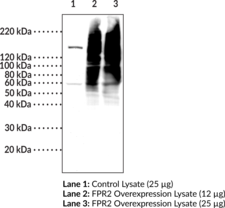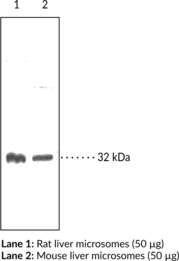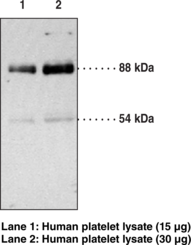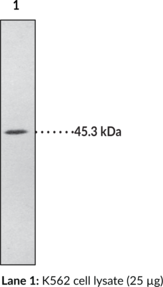Description
Formyl peptide receptor 2 (FPR2) is a G protein-coupled receptor (GPCR).{42688} It is encoded by FPR2 and is expressed in lung, kidney, spleen, placenta, macrophages, peripheral blood leukocytes, synovial fibroblasts, T cells, and intestinal epithelial cells. FPR2 is coupled to the Gi/o transduction pathway and is activated by various ligands including formyl peptides from bacteria and mitochondria, endogenous and aspirin-triggered resolvin D1, lipoxin A4 (Item No. 90410), annexin A1 (Item No. 19881), amyloid-β (1-42) (Aβ42; Item No. 20574), and prion protein (106-126) (Item No. 24556), among others.{42688,42689,42690} Activation of FPR2 by formylated bacterial peptides increases monocyte chemotaxis and neutrophil recruitment in vitro, and fpr2-/- mice exhibit increased bacterial load and reduced neutrophil infiltration in response to L. monocytogenes infection.{42691} FPR2 activation by resolvin D1 (Item No. 10012554) reduces production of pro-inflammatory cytokines and reduces inflammatory pain in various murine models.{42687} Expression of FPR2 is increased in mononuclear phagocytes in postmortem brain tissue from patients with Alzheimer’s disease and transient interaction of Aβ42 with FPR2 promotes receptor complex internalization and cytosolic deposition of Aβ42 in macrophages.{42692} Cayman’s FPR2 (C-Term) Polyclonal Antibody can be used for Western blot and immunohistochemistry (IHC) applications. The antibody recognizes the C-terminus of FPR2 from human samples.
Synonyms: Formyl Peptide Receptor-Like Receptor 1|FPRL1|HM63|Lipoxin A4 Receptor|N-Formyl Peptide Receptor 2|RFP
Immunogen: Synthetic peptide from the C-terminal region of human FPR2
Formulation: 500 µl of peptide affinity-purified polyclonal antibody
Isotype:
Applications: IHC and WB
Origin:
Stability: 365 days
Application|Immunohistochemistry||Application|Western Blot||Product Type|Antibodies|Polyclonal Antibodies||Research Area|Immunology & Inflammation|Adaptive Immunity||Research Area|Immunology & Inflammation|Inflammatory Lipid Mediators|Specialized Pro-Resolving Mediators||Research Area|Immunology & Inflammation|Innate Immunity||Research Area|Infectious Disease|Bacterial Diseases|Food-borne Illnesses||Research Area|Lipid Biochemistry|Cytochrome P450 Pathways||Research Area|Lipid Biochemistry|Fatty Acids|Degradation||Research Area|Neuroscience|Neurodegenerative Disorders|Alzheimer’s Disease




